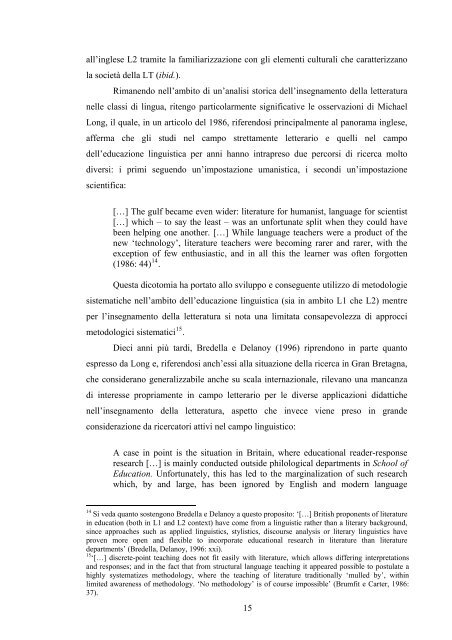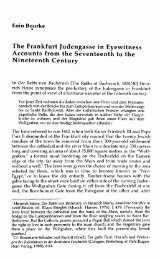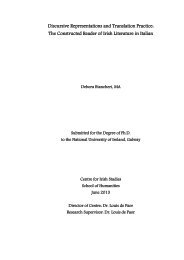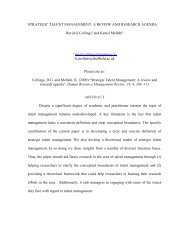- Page 1 and 2: Testo letterario e ipertesto nell'i
- Page 3 and 4: Abstract This research project show
- Page 5 and 6: 3.2.2 Primo I/L………………
- Page 7 and 8: Appendice XV …………………
- Page 9 and 10: Figura n. 7 …………………
- Page 11 and 12: comunicazione che porta a un cambia
- Page 13 and 14: Per dare supporto all’ipotesi cen
- Page 15 and 16: strutture grammaticali al fine di o
- Page 17 and 18: Capitolo I La letteratura nelle cla
- Page 19 and 20: Il testo letterario, tra le produzi
- Page 21 and 22: Celentin e Beraldo, nella pubblicaz
- Page 23: connotazione assume un’importanza
- Page 27 and 28: mansioni pratiche inerenti all’in
- Page 29 and 30: da un profondo rispetto verso […]
- Page 31 and 32: scopi del corso di studi: le analis
- Page 33 and 34: elonging to a number of social grou
- Page 35 and 36: più in un rapporto dicotomico 27 ,
- Page 37 and 38: nel testo letterario, appartenente
- Page 39 and 40: Kramsch, with Nolden (1994), presen
- Page 41 and 42: This book aims to expand the scope
- Page 43 and 44: Le modalità di utilizzo dei testi
- Page 45 and 46: elaborare dei parallelismi o esprim
- Page 47 and 48: degli strumenti tramite cui rafforz
- Page 49 and 50: introdottovi dal destinatario’ (1
- Page 51 and 52: valutazione del contenuto - focus o
- Page 53 and 54: personalizzazione degli ambienti in
- Page 55 and 56: With the former [native-speaker], m
- Page 57 and 58: Come messo in rilievo da Rosenblatt
- Page 59 and 60: La memorabilità è strettamente co
- Page 61 and 62: afferma: ‘‘response’ is alrea
- Page 63 and 64: I ‘segmenti del testo’, ossia i
- Page 65 and 66: 103) dell’ipertesto ma sottolinea
- Page 67 and 68: Questo peculiare tipo di dialogo co
- Page 69 and 70: Un concetto chiave alla base della
- Page 71 and 72: strutturare l’informazione e di i
- Page 73 and 74: icerca 16 . Vorrei però riportare
- Page 75 and 76:
aggiunge qualcosa in più ai proces
- Page 77 and 78:
Federico Pellizzi, nelle sue divers
- Page 79 and 80:
diverse funzionalità del testo, tr
- Page 81 and 82:
[s]pazio dove vengono messi a punto
- Page 83 and 84:
percorsi preordinati, modifica […
- Page 85 and 86:
Questi tre modelli hanno dominato l
- Page 87 and 88:
Tra i tre principi costruttivisti e
- Page 89 and 90:
Assimilazione e accomodamento sono
- Page 91 and 92:
concorda che ci sono punti di conta
- Page 93 and 94:
[q]uando si parla di apprendimento
- Page 95 and 96:
idondanza; 6) principio della perso
- Page 97 and 98:
l’accostamento globale a un testo
- Page 99 and 100:
questa figura professionale vengono
- Page 101 and 102:
strumento elettronico rende evident
- Page 103 and 104:
ipercussioni importanti sulle dinam
- Page 105 and 106:
seguire e, soprattutto interagisce
- Page 107 and 108:
Basandosi su quanto sostenuto dai d
- Page 109 and 110:
e alla possibilità di comunicare i
- Page 111 and 112:
e si chiede se questo consista nel
- Page 113 and 114:
giornalisti cambiava secondo il dis
- Page 115 and 116:
Capitolo III La proposta operativa
- Page 117 and 118:
anno del corso di studi di Arts e l
- Page 119 and 120:
utilizzo di tale dispensa è conseq
- Page 121 and 122:
compiti infrasettimanali - valutati
- Page 123 and 124:
Il secondo incontro con gli student
- Page 125 and 126:
appare la dislocazione destinale de
- Page 127 and 128:
Come si nota, i tentativi di interp
- Page 129 and 130:
didattiche specifiche finalizzata a
- Page 131 and 132:
attività di lettura degli ipertest
- Page 133 and 134:
iconosciuto il congiuntivo, così s
- Page 135 and 136:
Studente L Prof. Bandini: “Il mio
- Page 137 and 138:
hanno evidenziato una sicurezza nel
- Page 139 and 140:
3.2.8. Settimo I/L Lezione 7 (25 fe
- Page 141 and 142:
Fasi: Globalità Analisi Rifless
- Page 143 and 144:
Durante questa attività di produzi
- Page 145 and 146:
Appendice XI) in classe, ma si è c
- Page 147 and 148:
contesti creati dagli studenti stes
- Page 149 and 150:
studenti hanno reimpiegato in modo
- Page 151 and 152:
2 frasi su 4 per il periodo ipoteti
- Page 153 and 154:
Figura 4 - Reimpiego corretto del p
- Page 155 and 156:
ilevanti della sintassi, mostrando
- Page 157 and 158:
La seconda composizione (fig. 8) è
- Page 159 and 160:
La quarta composizione (fig. 10) è
- Page 161 and 162:
1 studente su 4 ha utilizzato il pe
- Page 163 and 164:
Rispondendo alla domanda n. 2, 4 st
- Page 165 and 166:
4. ‘Sì. Lo stili è completament
- Page 167 and 168:
il loro gradimento per un corso che
- Page 169 and 170:
2. ‘Yes, I found it a good techni
- Page 171 and 172:
iniziale non è stato semplice ma p
- Page 173 and 174:
osservazioni rilevanti che possono
- Page 175 and 176:
particolare alla proposta operativa
- Page 177 and 178:
eciprocamente e producono revisioni
- Page 179 and 180:
processi di ‘elaborazione’ (a l
- Page 181 and 182:
la comprensibilità dell’input po
- Page 183 and 184:
dunque: ‘explicit knowledge helps
- Page 185 and 186:
aggiunge che l’input viene trasme
- Page 187 and 188:
cognitivamente nelle diverse attivi
- Page 189 and 190:
Dalla descrizione del corso present
- Page 191 and 192:
[s]econdo la quale le funzioni dell
- Page 193 and 194:
come potenziamento degli altri perm
- Page 195 and 196:
Danesi afferma che sia i metodi che
- Page 197 and 198:
concettuale è a sua volta legata a
- Page 199 and 200:
della lettura procede in modo tale
- Page 201 and 202:
formano in base a relazioni comples
- Page 203 and 204:
infatti, stimolate dalle strutture
- Page 205 and 206:
Il fatto che vengano ricordati dett
- Page 207 and 208:
ipertesto ha permesso agli studenti
- Page 209 and 210:
mantenerle in relazione agli intere
- Page 211 and 212:
stata anche utile per rafforzare i
- Page 213 and 214:
studenti di fare esempi, di provare
- Page 215 and 216:
nell’acquisizione della seconda l
- Page 217 and 218:
un voto finale perché non si volev
- Page 219 and 220:
sottostanti la scelta del tipo di p
- Page 221 and 222:
storie, anch’esse inventate, atti
- Page 223 and 224:
processo di scrittura, anche se le
- Page 225 and 226:
sempre trovato il tempo in classe p
- Page 227 and 228:
Conclusioni Nel presente progetto d
- Page 229 and 230:
1. Le caratteristiche peculiari del
- Page 231 and 232:
quanto la competenza linguistica, i
- Page 233 and 234:
memorizzazione del nuovo lessico da
- Page 235 and 236:
6. Secondo te, leggere un articolo
- Page 237 and 238:
___________________________________
- Page 239 and 240:
Lezione 6 (18 febbraio) Lezione 7 (
- Page 241 and 242:
Appendice V Primo brano letterario
- Page 243 and 244:
Appendice VI Es. 1) TRASFORMA le fr
- Page 245 and 246:
AndarCI, venirCI => quando CI sosti
- Page 247 and 248:
- Vuole dire che senza di lui non m
- Page 249 and 250:
Appendice VIII Verifica 4BA - giove
- Page 251 and 252:
Appendice IX (Parte della sezione g
- Page 253 and 254:
Esempio: Sei un cantante di fama in
- Page 255 and 256:
Glossario: Schermo = screen Cristal
- Page 257 and 258:
“Tutto,” ho detto io. “Tu e q
- Page 259 and 260:
Appendice XII PRIMA COMPOSIZIONE pe
- Page 261 and 262:
Appendice XIV TERZA COMPOSIZIONE su
- Page 263 and 264:
Appendice XVI Quinta composizione -
- Page 265 and 266:
Studente D (5 composizioni su 5) St
- Page 267 and 268:
Studente N (3 composizioni su 5) 2
- Page 269 and 270:
Studente M 3 a composizione 1 perio
- Page 271 and 272:
Studente H Studente I Studente L St
- Page 273 and 274:
Studente C Studente D Studente E St
- Page 275 and 276:
5 a composizione Indicazioni: dialo
- Page 277 and 278:
Tabella n. 27 268 - la casa. “Per
- Page 279 and 280:
3. Che tipo di letteratura preferis
- Page 281 and 282:
7. Cosa pensi degli ipertesti? 8. T
- Page 283 and 284:
Appendice XIX Secondo questionario
- Page 285 and 286:
la letteratura in lingua straniera
- Page 287 and 288:
Appendice XX Tabella n. 30 278
- Page 289 and 290:
Appendice XXII Tabella n. 32 280
- Page 291 and 292:
Baricco, A. (1999). City. Milano: E
- Page 293 and 294:
Ciotti, F. , Cos’è la codifica i
- Page 295 and 296:
Giacalone Ramat, A., Vedovelli, M.
- Page 297 and 298:
Lazar, G. (1996). Exploring literar
- Page 299 and 300:
Pardo, L. S. (2010). What every tea
- Page 301 and 302:
Siviero, C. (2002). Insegnare lette





